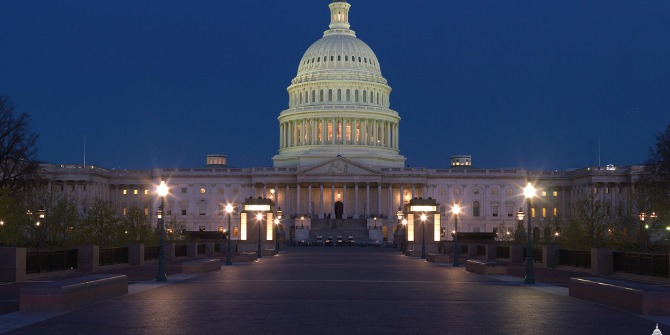In his latest book, Is the American Century Over?, Professor Joseph S. Nye argues that, despite the rise of China, America is not declining. Instead, he writes, we are seeing the rise of the rest. The book is reviewed by Jonathan Freeman.
![41LsMupBqiL._SY344_BO1,204,203,200_[1]](https://blogs.lse.ac.uk/lsereviewofbooks/files/2015/06/41LsMupBqiL._SY344_BO1204203200_1.jpg) Is the American Century Over?, by Joseph S. Nye, Jr. Polity Press. 2015
Is the American Century Over?, by Joseph S. Nye, Jr. Polity Press. 2015
Most readers will read this book with a degree of bias. My own perspective on the subject is heavily influenced by my own status as an American. Personally, I do not think America’s best days are behind us and in spite of (or perhaps because of) our regular blundering we do try to do better, to be better. As Churchill famously observed; “You can always depend on the Americans to the right thing, after they’ve tried everything else.”
Nye begins the book with a general synopsis of the period that has become known as the “American century.” There is little doubt that America has dominated this time period in the areas of both hard and soft power, argues Nye. He delineates the various ways both statistically and allegorically that the United States has possessed and wielded power over the past hundred years or so.
In chapter 2, Nye explores the notion – keenly felt by Americans – of contemporary American decline. He discusses the almost neurotic fever with which many Americans have continuously perceived their national decline since the end of World War II. Nye completes the chapter with an historical narrative of other great powers in the world, showing how and where America has stood in history with regard to its rivals, leading into a comparison with other prominent powers over the same period.

Assessing the “challengers”; Europe, Japan, Russia, India, and Brazil, Nye argues that all have substantive structural problems which inhibit them from seriously competing with the United States in terms of both hard and soft power. Europe, while a credible economic competitor prior to the meltdown of the Greek economy, cannot compete either through cultural influence or military might. He then cites evidence which shows that Japan has serious cultural stigma issues, and that Russia stands on an economic house of cards. He explains that India has an even greater degree of economic disparity between the rich and poor than does the United States, and finally that Brazil has thus far been unable to develop influence based on its economic success. This leaves, in Nye’s view, China as the sole credible threat to American influence and power.
Nye devotes the entire fourth chapter to analysing the nature and viability of China’s attempt to overhaul the United States as the pre-eminent global superpower. Assessing China’s economic, military, and soft power – he concludes that, “China still lags far behind the United States in all three dimensions of power.” On the economic side, he argues that in spite of the fact that China’s may surpass the United States in the areas of purchasing power parity and gross domestic product, it is still some distance from actually overtaking the United States in real terms. In this, he states, the American system still has numerous advantages over China in terms of overall national development, currency trading, and rule of law, particularly in the areas of property and intellectual property.
While Nye does not make extensive comparison of military capabilities between the United States and China, he clearly points out the disparity. In the areas of capabilities of logistics, modern weaponry, and budgeting the United States far outpaces China in the military arena. In the area of soft power, meanwhile, Nye argues that China’s heavy-handed efforts tend to be counterproductive in developing their desired levels of global influence. While he certainly does not claim that America has been deft in developing relations with other governments and peoples, Nye appreciates that America has displayed a far lighter touch than have the Chinese.
He continues by comparing America to the decline of Rome and finds the comparison wanting, only to concede that American pre-eminence “will probably not end[…]in the next 30 years.” He cites the US National Intelligence Council, which predicts that while the United States will likely remain the most power nation it will no longer be either a hegemon or the world’s sole superpower by 2030.
In conclusion, Nye has offered an intelligent and argumentative essay on the question of American decline. He has made a solid claim that the United States is not deteriorating; in fact it is steadily progressing in an integrated and expansionary manner, while other nations simply are developing faster in specific areas. An additional positive is the book’s brevity, offering not an extensive academic presentation on the subject, but a snappy and readable encapsulation of Professor Nye’s well researched and eminently defensible views on the subject.
____________________________________________________________
Jonathan Freeman is International Relations PhD student at LSE. His research examines military assistance as a tool of US foreign policy. He served as an officer in the United States Army in Iraq and Afghanistan and was a political appointee in the Obama Administration. He has a BA from University of Michigan, a Masters of Liberal Arts from Harvard University’s Extension School, and an MBA from UMASS – Amherst. He occasionally tweets @JFonIR.
Author Joseph S. Nye, Jr. gave a public lecture about his book at the LSE; you can listen here.







